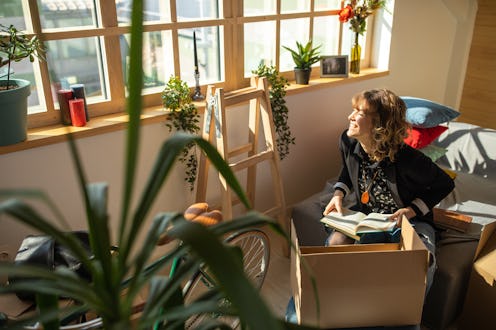Self
Dreading The End Of Quarantine? It’s More Common Than You Think
“It’s going to take me some time to not see these things as unsafe or dirty.”

Over the last year, you didn’t have to succumb to the kind of FOMO that lures you out of bed for a Sunday brunch when you'd really rather sleep in. Without a chatty co-worker at the desk next to you, your productivity went way up — and honestly, the WFH set-up turned out to be more than functional. As COVID vaccines continue to roll out, people will begin to emerge from their pods for good — finding that actually, they’re a little anxious for post-quarantine life.
“I definitely feel some sense of relief with the obvious caveat that nothing is going to go back to normal right away,” Chelsea, 28, who calls herself cautiously optimistic after her first shot, tells Bustle. “Once I’m fully vaccinated, I will definitely feel more comfortable eating at a restaurant or catching up with an old friend — but I’m not throwing out my mask anytime soon though, and my fiancé and I postponed our wedding again to 2022.”
Rebecca, 29, just got her second vaccine dose, but tells Bustle that she’s not ready to embrace “normal life” just yet. “I think I’m just so used to being terrified, my mind hasn’t registered that things could actually be going back to normal — my new normal is COVID life,” she says. Though Rebecca is open to spending time with close friends indoors, she says she can’t image going to a movie theater again, and has “no desire” to dine inside at a restaurant any time soon. “It’s going to take me some time to not see these things as unsafe or dirty.”
"I've been seeing contentedness in the faces of some of my therapy clients as they describe the odd sense of relief and stillness they've experienced since life as we know it changed," clinical psychologist Caroline Fleck, Ph.D., tells Bustle. "There is something indisputably restorative about just being — particularly in a society that heavily orients us towards doing," Fleck says. Over half of respondents to a March 2021 American Psychological Association survey said they felt uneasy about adjusting to IRL interactions, or outright uncomfortable going back to life the way it was before.
"Life is simply easier and less stressful when there's nowhere to go," says Robin, 34, who describes herself, pre-coronavirus, as a workaholic. "I am not looking forward to having to plan everything out again, having to run all over the place and stick to a tight schedule. There's less room to enjoy life that way," she adds.
Claire, 32, is struggling with conflicting feelings of grief and joy regarding re-entry. "The thought of the world opening back up again is giving me a lot of relief, but also anxiety — it feels like I'm being forced out of this sacred nest that we’ve created here where there are no social obligations or expectations, just time to be together," she tells Bustle. She adds that post-quarantine, she'll need an adjustment period before she is ready to put anything on her calendar again.
Of course, most people are supremely relieved that vaccines are here, at long last. But after a year in a yo-yo quarantine, people are starting to realize that their lifestyle and values are more aligned than ever at home. For Quinn, 28, the lack of adjustment periods between extremes is disorienting. "I feel like an abrupt transition back will not only be jarring but probably stressful because I’m going to be going back to some bastardized version of normal."
It feels like I'm being forced out of this sacred nest that we’ve created here where there are no social obligations or expectations.
Not everyone has found quarantine life to be "enlightening," and it has "exacerbated if not caused mental health symptoms" in many, Fleck says. But for those who find themselves anxious about returning to their normal lives, Fleck points to the psychological benefits of focusing on the present and learning to accept your life as it is, without judgment. "Solitude and mindfulness can be antidotes for FOMO and dis-ease," she says. These practices, Fleck adds, can temper our innate drive to keep up with what we see on Instagram.
Although forced isolation might make it easy to slow down, it's not the only way to practice mindfulness. You don't need to be in the middle of a pandemic in order to carve out time to connect with loved ones or to relax at home. "For those who find themselves reluctant to return to the unrealistic demands and sensory overload that seem to define normal life at times, my advice is simple: don't." Instead, Fleck suggests approaching post-lockdown life with intention. Pledge to turn down work-week plans or to spend weekends alone. Keep cooking or going on long walks or whatever is giving you peace right now. And as we slowly move back towards our old lives, it's important to remember that nothing will be the same. "Allow yourself to be changed by the changes you've endured," Fleck adds.
"Post-pandemic, I will definitely be more cautious with my personal and family time," Kelsey, 28, tells Bustle. "I will not let my social calendar get overwhelming ever again, and I will try to carve out at least one day a week with just my family, quarantine-style."
Expert:
Caroline Fleck, Ph.D., founder and clinical director of Luma, and an adjunct clinical instructor at Stanford University
This article was originally published on